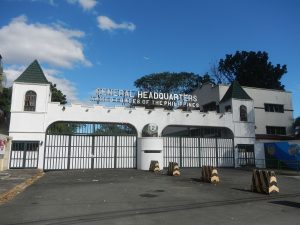On September 7, Philippine Foreign Secretary Teodoro Locsin Jr. delivered the unexpected news that country’s president, Rodrigo Duterte, had pardoned an American Marine convicted of killing a transgender woman six years ago.
In 2015, U.S. Marine Lance Cpl. Joseph Scott Pemberton was convicted of strangling and drowning Jennifer Laude, a 26-year-old transwoman. The pair met at a bar in Olongapo City in October 2014, shortly after the Marines arrived for joint military exercises. After taking her back to a hotel room, Pemberton, then 19, admitted choking and drowning Laude after discovering she was transgender.
Duterte’s pardon came a week after a court in Olongapo granted Pemberton an early release on grounds of good behavior, a decision that was stayed pending an appeal by lawyers representing Laude’s family. That process has now been negated by the presidential pardon, allowing Pemberton to walk free.
The presidential pardon has unsurprisingly shocked and angered relatives of the victim. Virginia Suarez, a lawyer for Laude’s family, said that it made a “mockery” of the country’s justice system. UP Babaylan, a group that advocates for the LGBT community in the Philippines, described the pardon as “a direct attack not just on Jennifer and her family but to every trans person and every victim of corrupt and unequal justice system.”
The pardon has also served as a flashpoint for anger over the overbearing influence of the United States, which ruled the Philippine islands as a colony for five decades, and still retains considerable influence there. Over the decades, the Philippines has seen frequent eruptions of nationalist anger against the U.S. presence, often linked to the behavior of American personnel. The issue figured heavily in the successful campaign that sought the closure of the giant U.S. military bases at Subic Bay and Clark in the early 1990s, and has raised its head periodically ever since.
Opponents of American military involvement in the Philippines have long taken aim at the Visiting Forces Agreement (VFA), a bilateral accord brokered in the years after the closure of Subic and Clark. The VFA lays out procedures governing U.S. military personnel in the Philippines, including the handling of criminal cases involving them.
It was under the terms of the VFA that Pemberton was able to serve much of his sentence in solitary confinement inside Camp Aguinaldo, a military camp in Quezon City, rather than in one of the country’s notoriously overcrowded prisons. At the time of Pemberton’s arrest in 2014, LGBT rights advocates and Philippine senators cited the case in calling for a review of the VFA, which they claimed had allowed U.S. military personnel to commit crimes with virtual impunity.
In February, Duterte threatened to scrap the VFA after the U.S. government imposed a visa ban on his ally, the former national police chief Ronald dela Rosa, who coordinated the opening salvos of Duterte’s notorious “war on drugs” before being elected to the Senate in 2019. Duterte then reversed his stand on the VFA in June, before the cancellation could come into effect.
In a statement following the pardon, Renato Reyes, Jr., secretary-general of the patriotic left-wing coalition BAYAN, linked the pardon to Duterte’s backflip on the VFA. “The Philippine president has restored the VFA to please the Americans. He has gone even further by pardoning Pemberton who was the subject of special treatment under the VFA,” Reyes said. “So much for claims of having an independent foreign policy. The U.S. government had its way again on this issue.”
Both Duterte’s pardon, and the reaction to it, encapsulate the conflicted relationship that many Filipinos have to their former colonial master. Intimately linked to the U.S. by affinities both political and cultural, few nations view the U.S more positively. One survey conducted by the Pew Research Center in 2018 found 83 percent of respondents in the Philippines said they had a favorable view of America—a higher proportion than in the U.S. itself (79 percent).
At the same time, there has always been a minority constituency that has been highly critical of U.S. influence in the Philippines – none more prominent than Duterte himself. Since taking office in 2016, the trash-talking former mayor of Davao City has spurned the U.S., threatening to kick out U.S. military personnel and abrogate the two nations’ treaty alliance.
At the same time, he has steered the Philippines toward China, despite Beijing’s increasingly hostile actions in the South China Sea where the two countries have territorial disputes. All the while, he has called up memories of atrocities committed by U.S. troops during the pacification of the southern Philippines in the early twentieth century. Shortly after taking office, Duterte’s foreign secretary announced that the Philippines could not “forever be the little brown brothers of America.”
For his own part, Duterte has denied that Pemberton’s pardon was engineered to please the U.S. “It’s my decision to pardon,” he said. “We have not treated Pemberton fairly, so I ordered his release.” But given the timing of the pardon – following on the heels of the court’s decision to stay the American’s release on appeal – it is hard to avoid the conclusion that justice for Jennifer Laude has been subordinated to the administration’s scattershot geopolitical signaling.
In many ways, Duterte’s flip-flopping encapsulates a tendency among a certain section of Filipino political opinion, which resents the continuing U.S. presence – even as it depends on it. In his 1989 book “In Our Image: America’s Empire in the Philippines,” Stanley Karnow noted that when it comes to their relationship with their former colonial masters, Filipinos “seem to be trapped in a tangle of contradictions.” Since being granted independence in 1946, “their attitudes towards the United States vacillated between imitation and resentment, subservience and defiance, adulation and contempt, love and hate.”
He added, “ The same dichotomy continues to trouble them.”

































